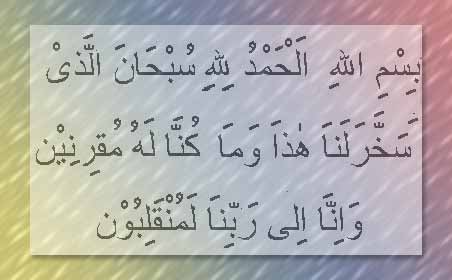
The Biography of
Muhammad Sallallahu Alaihi Wasallam
Compiled and presented by

| Lesson 4 | ||||||||||
|
The Prophet Sallallahu Alaihi
Wasallam as a trader
In his youth he acquired good experience in trade during his journeys with his uncle, Abu Talib. He also developed a reputation of fairness and honesty in his dealings. He was given the title of Al Amin - the trustworthy. Once Abdullah Ibn Abi Al-Hawsa negotiated a business deal with the Prophet Sallallahu Alaihi Wasallam. He promised to meet him later but forgot. The Prophet Sallallahu Alaihi Wasallam waited for him at the appointed place for three days. When Abdullah remembered he hastily came and found the Prophet Sallallahu Alaihi Wasallam waiting for him. He did not scream at him but simply said : "You put me to trouble for I have been waiting here for the last three days." (1) Marriage with Khadija Radhi Allahu Anha The Prophet Sallallahu Alaihi Wasallam married Khadija when he was twenty five years of age. She was a widow of forty. She was so wealthy that in the trade caravans that used to set out from Makkah her merchandise equalled that of the rest of the Makkans put together. More importantly, she was intelligent and kind. Like other merchants of Arabia, she hired other men to sell her merchandise outside the country. She had a positive experience of the Prophet's Sallallahu Alaihi Wasallam honesty when he traded on her behalf in Syria. She expressed her desire to marry him. He agreed. All the children of the Prophet Sallallahu Alaihi Wasallam were born to this wedlock except Ibrahim who passed away in infancy.(2) Reconstruction of the Kabah When he was thirty-five the Prophet Sallallahu Alaihi Wasallam settled a grave dispute which had threatened to plunge the Quraish into a major war. The Ka'bah was being reconstructed after being damaged by water. The Quraish undertook the task and allotted to each family a portion so that nobody could be deprived of the honour. Even the Prophet Sallallahu Alaihi Wasallam helped in this like an ordinary labourer carrying heavy stones on his shoulders. When it came to placing the Hajrul Aswad in place all the tribes wanted to claim the honour of this. For a number of days there were disputes and tribes even vowed to fight to the death to win this honour. Finally, they decided that the first person to enter the holy precincts of the Ka'bah would decide between them. Almost by divine intervention this happened to be the Prophet Sallallahu Alaihi Wasallam. They all agreed to make him the judge having known and witnessed his justice. The Prophet Sallallahu Alaihi Wasallam asked them to bring a cloth. He placed the stone on the cloth and asked each of the tribes to hold a portion of the cloth and raise it to the required height. He then placed it in it's position with his own hands. (3)
|
||||||||||
Lessons to learn
|
||||||||||
| Dreams that come true As prophethood was no easy mission the Prophet Sallallahu Alaihi Wasallam had to go through a preparatory stage. This began in the form of dreams. Dreams were a form of early revelation to him. The Cave of Hira Being exposed to the vices and evil ways of the pagan Arabs, the Prophet Sallallahu Alaihi Wasallam preferred the solitude of the cave of Hira where he remained for days at times spending his time meditating and worshipping Allah. It was the 17th of Ramadhaan and he was now forty years of age. He lay wide-awake when the angel, Jibraeel Alaihis Salaam, suddenly appeared before him and said, "Read". He answered truthfully, "I cannot read." The Angel pressed him until he felt the pain after which he let him go and said again, "Read." The Prophet Sallallahu Alaihi Wasallam replied for the second time, "I cannot read." Jibraeel again pressed him tightly until he felt the pain and then letting him go, said, "Read." When he replied again, "I cannot read," he pressed him a third time and let him go. He then said: "Read! (0 Muhammad!) In the
name of your Lord who created. Frightened by the strange experience he ran back home to Khadija Radhi Allahu Anha exclaiming: "Cover me, cover me!" He explained to her what had happened. Khadija Radhi Allahu Anha was an intelligent woman. She was most conversant with the noble character of her husband and knew that Allah would never deceive him. She assured him with words of confidence: "I swear to Allah that He would never shame you. You join the ties of relationship. You speak the truth, you bear people's burdens, you help the destitute, you entertain guests and you endure the pains and grief suffered for the sake of truth." (4) Prediction of Waraqa Ibn Naufal Khadija Radhi Allahu Anha wanted to know and confirm exactly what had happened to her husband. She took him to her cousin, Waraqa Ibn Naufal who, she knew, could be of help. When the Prophet Sallallahu Alaihi Wasallam explained to him what had transpired, Waraqa cried out : "Verily, by Him in whose hands is Waraqa's soul, you are the prophet of this people. The archangel, Jibraeel, who came to Musa has come to you. A time will come when you will be called a liar. Your people will ill-treat you, cast you out and fight you." The Prophet Sallallahu Alaihi Wasallam was surprised because people had always respected him. "What! Will they expel me?" he asked. Waraqa replied, "Yes, for no man has ever brought anything like what you have brought without being opposed and fought by his people. This has always been so. If I live to see that day, I will support you." (5) Khadija Radhi Allahu Anha was the first to accept Islam. Ali Ibn Abi Talib Radhi Allahu Anhu, a boy of ten, accepted Islam next. Abu Bakr Radhi Allahu Anhu, a reputable and wealthy person accepted Islam early on as well. He had 40 000 dirhams when he embraced Islam. Those who later accepted Islam at the invitation of Abu Bakr Radhi Allahu Anhu included the elite of the Quraish like Uthman Ibn Affaan, Zubayr Ibn Awwam, Abdur Rahman Ibn Auf and Sa'd Ibn Abi Waqqas Radhi Allahu Anhum. Slowly the mission of the Prophet Sallallahu Alaihi Wasallam began spreading to others who had open minds and were in search of the truth. The early converts were pure and virtuous by heart before Islam came to them. Many of them were in search of the truth and had given up idol worship. Many of them had no status in society. They were poor and humble.
|
||||||||||
| Lessons to learn
|
||||||||||
________________________________________ (1) Sunan Abu Dawood (2) Ibn Hisham (3) Ibn Hisham (4) Bukhari (5) Bukhari ___________________________________
|
||||||||||
|
Dua before a journey
Meaning : In the name of Allah. All praise is due to Allah. Purity belongs to that being Who has subjected this conveyance for us and we were not capable of controlling it and, surely, to our Lord is our return. |
Sunnah It is preferable to perform Nafl Salaah before setting out on a journey. If more than three people are travelling in a group one should be made the leader (ameer). |
|||||||||

